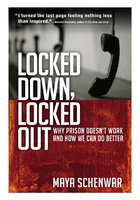Look at everything as though you are seeing it for the first time, with eyes of a child, fresh with wonder.
—JOSEPH CORNELL
Because our thinking plays such a crucial role in triggering our feelings and moods, it follows that if we can change our thinking, we can often change our mood. It isn't easy, but there is one technique that sometimes works. It's called a pattern interrupt, and it is simply a way to let go of one train of thought and switch to another.
What follows is what a pattern interrupt might look like in everyday life.
Imagine that you are in a low mood, concerned about something that happened during the day. It might be a difficulty at work, a relationship challenge, or an issue in your community—let's say, for example, the recent news that a local reservoir may have been contaminated with waste from a nearby factory.
You've spent the day obsessing about the news, discussing it over the breakfast table with your spouse and around the water cooler with your colleagues. Driving home from work, you are thinking about it and directing the movie in your mind:
Suppose it turns out that the local water supply has been polluted—and maybe it has been for the past few years. What does that mean for my health and that of my family? Will one of us develop cancer in the near future? Maybe my kids' brain functioning has been impaired—it could be that their grades are going to suffer. And as the word spreads, property values in our town are sure to fall. We may not be able to sell our house at all! And we have most of our family wealth tied up in our home equity. This could turn out to be a disaster that will affect us for years to come.
By the time you get home, you're in a state of extreme stress, hostility, and depression. But as you walk in the door, the phone rings. It's your best friend. Just hearing his voice makes you feel better. And what he has to say is even more cheering: “Remember that Broadway show that's coming to town next week? I managed to snag four tickets, and we want the two of you to join us. We'll have dinner first and make it a fun night out. What do you say?”
You and your buddy chat about how great it will be to get together and how excited your spouses will be. Your mood shifts immediately because your thinking has shifted. Later, when thoughts about the water supply return, you find yourself thinking about it in a different way:
Of course, there's no proof yet that the reservoir is polluted. Let's wait and see what the county report shows. And we haven't heard about any possible health effects. Nobody in the family has shown any unusual symptoms so far—knock wood! And if it turns out that there is a problem with the water supply, there are steps we can take. We can install a filtration system or use bottled water. And we're lucky to have access to good medical care at the clinic here in town. Let's take it one step at a time.
What happened in this story is a pattern interrupt. In many situations, you can invoke your own pattern interrupt rather than wait passively for one to occur from an external source. Pattern interrupts can take many forms, and you need to discover the kinds of pattern interrupts that work for you.
Varieties of Pattern Interrupts
A good night's sleep is a healthy pattern interrupt that's available to everyone. You've almost certainly experienced the mood-altering power of sleep. After a long, tough day, the world often looks overwhelming, people are irritating, and the answers to the problems you face are not evident. But after you get a good night's sleep, though your circumstances haven't changed, your world looks better, simply because your thinking in the morning is different from how it was the night before.
For me, exercise can be a powerful pattern interrupt. I may be tired and feeling low when I roll out of bed in the morning, but by the end of my daily run I am usually inspired, full of good ideas, and ready to face the world. Scientists tell us that running produces endorphins that create a natural high, but there's more to exercise than that. The rhythmic pace, the music I listen to, the natural scenery flowing by—the combination of these positive stimulants clears my mind and quiets me down. Medical experts and psychologists confirm that chemical and physiological factors have a powerful impact on our thoughts and moods, which is why physical activities that alter our internal chemistry can be great pattern interrupts.
Many other forms of exercise can have the same effect. The intake of oxygen associated with deep breathing does a lot to improve my mood. In fact, just focusing on your breathing can be a mini–pattern interrupt. That's why the breathing techniques associated with meditation and prayer can operate much like exercise in quieting the mind and interrupting any negative patterns you've fallen into. (We delve more deeply into the mind/body connection in chapter 9 and describe some additional self-care techniques you can use to stay on a positive emotional and mental path.)
Moods are also contagious. Studies have shown that if you put a person with a low mood state into a group or meeting, often the mood of the whole group goes down. Conversely, if you put a person in a high mood state into a gathering, the higher mood state also tends to be contagious.
You can consciously take advantage of the contagious quality of moods. When taking a long road trip for client work, I sometimes feel weary and overwhelmed. When this happens I call my wife. She listens as I talk about my day, and she often shares news about something fun, interesting, or exciting that our kids have done. The longer we talk, the more I feel my spirits rising. Bernadette is my pattern interrupt because I generally catch her positive mood state, particularly when I need it most.
Of course, not everyone can play this kind of positive role in your life. While it is not good to categorize people, especially in a rigid way, there are some people in my life whom I tend to view as energy pumps, while others seem to be energy drains. If I want an uplift, I will try to connect with someone who is already where I want to be on the Mood Elevator. Spending time with people in your life who can raise your spirits can be a pattern interrupt—an automatic mood lifter.
By the same token, I try to minimize the time I spend with people who consistently bring me down—although of course it isn't always possible to avoid them. When I must interact with people who tend to dwell on the lower floors, I hope I can act as an energy pump for them, providing them with a bit of the positive energy they seem to lack.
It's a great life strategy to try to surround yourself, to the extent that you can, with people who have a positive influence on your thinking and moods. That quality is something we select and hire for at Senn Delaney. If you get a chance to meet one of our consultants or teammates from our offices around the world, you'll immediately feel the positive energy they exude.
Self-talk can also make a difference in managing moods. I have used self-talk as a pattern interrupt to break out of my worry habit. As mentioned earlier, I've learned to recognize the onset of worry by the emotions it generates, as well as by the thoughts that start swirling around in my head. (I call these my “mental eddies.”) Now, as soon as I notice my thinking beginning to swirl in this unproductive, mood-darkening fashion, I say to myself in a lighthearted way, There you go again!
Simply being aware of your emotions and giving yourself gentle reminders about how to deal with them can help you check a negative mood before it has a chance to take hold.
Even kids can learn how to use pattern interrupts to transform their attitudes. When our teenage son, Logan, gets upset, bothered, or stressed, he lets my wife and me know that it's best to leave him alone. We've discovered that it's not productive to try to talk to him when he is in the grip of a lower mood state.
Instead, Logan has devised his own system for dealing with it. He goes into his room, shuts the door, and engages in activities he really enjoys—things he can get lost in that distract him from his lower-level thinking. It may be watching a favorite program or playing a computer game that takes his full concentration. Before long Logan emerges from his room and is the loving, lighthearted son we know and love.
Lots of kids have developed an approach similar to Logan's. The main difference is that Logan has done it consciously and practices it deliberately. I know it's true because I once heard him explain his process to the other kids in his Sunday school class: “When I get real grumpy like that, it's not really me,” he said. “I'm afraid I will say things I really don't mean, so I don't want to be around people. When I feel I'm myself again, I come back out and join the family.”
Computer games are Logan's pattern interrupt. Yours could be a round of golf, a favorite piece of music, a yoga routine, a few minutes playing with a much-loved pet, or a chat with your favorite relative. Experiment until you discover what works for you—and pull it out of your tool kit whenever you feel the need.
Focusing on a Higher Purpose as a Pattern Interrupt
One powerful way to interrupt a negative pattern of thinking and feeling is to shift your attention to a higher purpose. Escaping from your thoughts about yourself—especially when they are centered on worries, fears, insecurities, and hostilities—and moving into thinking about others and their needs can make your Mood Elevator take a big surge upward, gaining access to higher-level thinking, as well as a deeper sense of peace and optimism.
Your “higher purpose” doesn't have to be a grand one. It just needs to be bigger than yourself—something that makes a positive difference in the world. Here are a few simple examples:
Images Listening to a friend in need and offering support and encouragement without judgment or criticism
Images Contributing time or money to a worthy cause
Images Committing to live a spiritual life and modeling those principles in your daily behavior
Images Coaching a kids' team, serving as a team parent, or helping lead a youth group
Images Mentoring a young person in need of guidance, advice, and help
Images Participating in a charity run or walk in support of a good cause
Images Being an attentive parent—caring for and teaching positive values to your child
Images Volunteering at a local soup kitchen, homeless shelter, emergency hotline, or other community service endeavor
Whenever we get past ourselves and do something for others, we shift our mood and raise our spirits. Because we are spending more time on the higher floors, we become more purposeful, creative, and positive—and end up contributing even more to the world around us. It's a wonderful, self-reinforcing cycle.
When Your Mood Elevator Refuses to Budge
As I've suggested, the list of possible pattern interrupts is infinite. Taking a walk, working out, listening to music, helping a friend or child, reading a book, volunteering for a cause, taking a shower or bath, enjoying a massage, taking a nap, going shopping, stopping to watch a sunset—any of these pattern interrupts can shift your thinking to a higher level. Your job is to experiment until you find the activities that work best for you.
Unfortunately, even the pattern interrupts you enjoy most may sometimes fail to work, which raises the question: Why is it so difficult to get out of certain low mood states, and what can you do when you are really stuck?
The basic problem is that our thinking always seems to make sense to us in the moment, even when it doesn't really make sense; supported by self-reinforcing emotions, it seems real and compelling. Furthermore, in many cases a low mood state is related to a real problem or challenge we are facing. As a result, we feel justified in our mood, thinking we have a “right” to feel the way we do. The fact is that riding the Mood Elevator up and down is a seemingly unavoidable part of life. Sometimes we are down—often for no apparent reason.
So, if on occasion your preferred pattern interrupt doesn't make a dent in how you are feeling, the best thing to do is to treat your low mood state like bad weather: Don't fight it; just surrender to being human. Know that, like dark clouds in the sky, your low mood will pass and you will feel better. It has happened before and will happen again. Realizing this will help you put the mood in perspective and get through it, doing as little damage as possible to yourself and others.
In most cases, what hurts us is not so much the bad moods we must sometimes suffer through but rather the serious mistakes we make when we overreact while in such moods.














